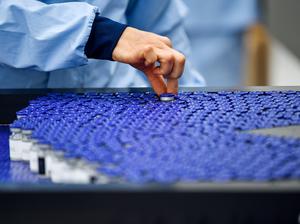As the year comes to a close, NTX Inno is looking ahead at the startups poised to shape the headlines of 2022.
We’ve put together – based on our past coverage, that of our colleagues at the Dallas Business Journal and talks we’ve had with players in the local industry – the annual Startups to Watch list for North Texas.
In it, you’ll find local up-and-coming companies, from those finding early funding and traction to those still stealthily plugging away at their ventures, that are showing promising potential to make a big impact in the region and beyond. And like the diversity of the DFW ecosystem, startups in the list range from entertainment and aerospace to edtech and social media. It also includes some making big claims like resurrecting the wooly mammoth.
Dive into the 22 Startups to Watch in 2022 below.
Pro tip: If you’re new to NTX Inno, you can follow our work by signing up to the NTX Inno Beat, our daily email newsletter on all things North Texas tech.
Aiden Technologies
Officially launched in 2021, Aiden Technologies is a autonomous endpoint security management services provider for Microsoft Windows users. Focusing on highly-regulated industries like financial services and life sciences, Aiden, led by CEO Joshua Aaron, helps with regulation compliance, cybersecurity and organizational standards.
In February, it unveiled an advisory board that includes Brian Leonard, the co-founder of TaskRabbit. It followed that with a $2.9 million seed funding round in June, led by Right Side Capital Management and joined by Congress Avenue Ventures, Intercept Ventures, SAJE Investments and Gaingels. The company is a member of the Microsoft for Startups program and said it has seen its annual recurring revenue increase by five times, without disclosing specific figures.
Animal Cloud Device Connectivity
It’s fitting that Animal Cloud Device Connectivity’s co-founders – Vice President Chris Matos and President Dylan Jones – are military veterans themselves, because their Texas Christian University-based startup is commercializing technology created by the U.S. Air Force Research Lab.
Originally designed to help military field medics monitor soldiers’ vitals and track the care they received, Animal Cloud is applying the technology to animals. The product works through a wearable wireless device that tracks things like heart rate, blood oxygen levels and blood pressure. Information is uploaded to a platform that can be accessed on smart devices, where it can be monitored and shared with other medical workers.
The company recently went through the CREATE seed fund accelerator program at TCU’s Neeley Institute for Entrepreneurship. Also this year, the company was accepted into the Cincinnati-based faith-focused accelerator OCEAN Programs, which is providing it with up to $25,000. It also helped connect Animal Cloud to an early-stage Chicago VC fund focused on “purpose-driven” founders that are helping Animal Cloud with a $50,000 seed investment.
Articulate Labs
This medical device company attempted to bring its tech to market in 2015, but had to hit pause. This time around, it doesn’t seem to be having the same problem bringing its wearable technology, which uses machine learning and electrical stimulation to model joint movement, to market.
Since relaunching in 2017, it has gone through accelerator programs from Health Wildcatters, Capital Factory, TMCx in Houston and pitched at MassChallenge Texas. So far, it has raised around $550,000.
Its KneeStim device synchronizes with a person’s movement, giving that same electrical current provided by physical therapy treatment into nearly any motion. Articulate Labs is currently working on a pilot study of its device at Switzerland's Clinique Romande de Réadaptation.
Recently it has added aortic therapy-focused company Endologix COO as a board member and former Argent International leader as its own COO.
Astrapi Corporation
Launched in 2009, Dallas’ Astrapi Corporation’s telecom technology uses spiral-based modulation with varying amplitude, which allows for more efficient data transmission, more reliable networks and the ability to receive signals in deep space that would otherwise be too weak to receive.
Since its founding, the company has raised about $1.5 million in grant, VC and other funding from places like the U.S. Air Force, Ascend Venture Capital, the Dingham Center for Entrepreneurship and the Texas A&M New Ventures Competition.
In mid-August of 2020, Astrapi was a cohort member of Colorado-based Catalyst Accelerator’s Cyber for Space Applications, which works with the Air Force Research Lab Space Vehicles Directorate and the recently created U.S. Space Force to find and grow startups working in the aerospace and defense industries that have technological applications in the public and private sector.
CollateralEdge
Early on in the pandemic, Joe Beard announced he was stepping down as a partner at Dallas early-stage venture capital firm Perot Jain. In September, the world found out what he was up to.
His new venture, Richardson-based CollateralEdge, which he co-founded with Joel Radtke, emerged from stealth with a $3.5 million funding round led by Beard’s former firm and joined by the likes of Pharos Capital Founding Partner Kneeland Youngblood and Capital Factory CEO Josh Baer.
The company is aimed at reducing the costs and barriers around bank financing for small- and medium-sized businesses. In late 2021, it added to its all-star lineup tapping former Elm Park Capital Management Managing Director Matt Mallett as its vice president of product and former enterprise risk officer at Vista Bank Brandon Pabalate as its director of risk and compliance.
Colossal
With a team in Dallas, Austin and Boston, Colossal is looking to bring back the dead – wooly mammoths that is.
Operating in stealth for the past two years, serial entrepreneur Ben Lamm’s newest venture emerged in 2021 with a $15 million funding round led by billionaire Thomas Tull.
Using gene editing, Colossal said it is four to six years from birthing its first mammoth calf, which it hopes will populate parts of Canada and Siberia. The company’s co-founders are Dr. George Church, a Harvard professor of genetics, and Chief Product Officer Andrew Busey, who previously co-founded Hypergiant, Conversable and Chaotic Moon with Lamm. Its leadership also includes Chief Operating Officer Kent Wakeford, who co-founded Integral Ad Science; Chief Legal Officer Brian Beard, a former managing partner of Wilson Sonsini Goodrich Rosati LLP; Chief Business Officer Peter Phillips, a former executive of Interactive & Distribution at Marvel Entertainment; and Head of Biological Sciences Eriona Hysolli, a former postdoctoral fellow in the Church Lab.
Digital Seat Media
If you’ve been the Oklahoma City Thunder at Paycom Center or been to a football game at SMU, Baylor or Oklahoma State University, there’s a chance you’ve used Fort Worth-based Digital Seat Media’s technology.
The company, launched in 2018, affixes a QR tag onto a seat at a venue, and with a scan of the phone, users are connected to things like digital programs, on-demand food delivery and promotional material.
Despite the pandemic’s effects on live entertainment, the company is expecting to deploy its tech into about 50 venues, translating into more than 1 million installed tags. The company’s rapid expansion is fueled by a multi-year partnership deal it inked with Plano’s Learfield IMG College, a collegiate athletics-focused media and technology company, giving Digital Seat access to all of Learfield’s clients.
Esposure
Esposure launched in 2015 as a company helping esports players go pro, but found its footing earlier this year with a pivot to focus on “esports-education-as-a-service.”
With a new focus on edtech, the company helps students find their niche and professional path in the industry.
Currently, Esposure serves between 25 and 50 students per month at its new headquarters in Duncanville. The company expects that number to increase after a strategic partnership deal with Canadian investment firm LaunchLife International to franchise its business model.
CEO Danny Martin said Esposure has seen more than $3 million in revenue over the past six months while adding about 12 people to its team since May. Martin has also recently hinted at fundraising plans.
EXOS Aerospace
One of only a handful of U.S. companies with an active launch license, EXOS Aerospace, a maker of reusable space vehicles is looking to produce its new orbital launcher in McKinney.
It has received an Innovation Fund grant from McKinney’s EDC to set up a 100,000-square-foot facility and has plans to hire close to 100 new employees.
The company is currently on a 30-month deadline to produce its new vehicle, which will help launch 10,000 satellites into space. In May, the company entered into an MOU with London business consultancy Whitefield International and Georgia-based firm I & J International to lead a $200 million Series A funding round.
Co-founder and COO John Quinn took over the EXOS in 2015, buying the assets of former Mesquite-based commercial space flight startup Armadillo Aerospace, which was launched in 2000 and found early success in Northrop Grumman’s Lunar Lander Challenge.
Gardenuity
Focusing its efforts on the B2B side of its business, the Dallas-based do-it-yourself gardening startup is seeing large growth since launching in 2017.
Led by Donna Letier, Gardenuity counts Uber, Toyota and Salesforce as clients for its kits and workshops. The company is currently in the midst of a $4 million fundraising effort – its first besides an early friends-and-family round.
Without disclosing specific figures, Letier said Gardenuity experienced 500% revenue growth from 2019 to 2020, marking a six-fold increase in the number of plants it sold. And it’s on track to see 200% net revenue growth this year.
Gig Wage
Dallas-based fintech Gig Wage’s platform focuses on payroll solutions for the gig economy and other 1099 workers. And by next year, it expects that platform to be facilitating close to $1 billion in payments each month.
To help do that, the company is on a path to more than double its headcount, bringing on between 20 and 30 new employees.
Some of those hires come from other big names in the tech industry. Chief Strategy Officer Ethan Austin comes from Techstars, one of Gig Wage’s backers. Clarisa Lindenmeyer, its chief brand officer is a former CRO for Tech Wildcatters. And Gig Wage’s newest hire, Kristen Blum is a founding member of influencer marketplace LTK.
At the beginning of the year, Gig Wage extended its $10 million Series A round to bring on Foundry Group as an investor. That round was led by Green Dot Corp. and joined by Continental Investors, Revolution’s Rise of the Rest and Techstars.
Hyperfan
With plans to launch its social media platform in 2022, Hyperfan has already attracted around 45,000 people to its waitlist.
The platform is aimed at directly connecting creators with their most engaged followers. Users take a quiz or complete a challenge to prove they are a top fan of a creator to connect with them, and so their interactions with their favorite influencers aren't just one in a “sea of comments.”
The company was founded by Ishan Goel, who is known for his work as a head influencer for Forbes and his role in getting a stock image of an egg to go viral in 2019. So far, Hyperfan has raised about $500,000 and counts Aristotle Loumis, co-founder of Chicago cannabis startup Fyllo, as its chairman and advisor.
InspectIR Systems
Frisco-based startup InpectIR Systems has been working on a device since 2017 to change the way people test for drug use. During the pandemic, the company has used that capability to test for COVID-19 with just a puff of breath, working closely with the FDA for the past few months with the hopes of receiving the proper approvals.
InspectIR tapped technical help and device design from the University of North Texas in a relationship that is both financial and collaborative.
The company's device is portable and can be easily carried. The testing time takes less than three minutes – much shorter than the process that involves a swab being placed inside a nose. And the process of blowing into the machine isn't such a hassle.
So far, the company has raised nearly $3 million. And, according to Co-founder John Redmond, InspectIR is aiming to raise a new round of funding between $8 million and $10 million.
Language Learning Market
In the midst of a $500,000 seed raise effort, McKinney-based Language Learning Market is a three-part content platform comprised of a marketplace to buy educational resources from businesses large and small worldwide, a directory of resources and places to learn, and an education-focused media network.
The company launched in 2021 and is led by CEO Allison Monroe. It also received more than $30,000 in grant funding, in addition to grant funding from the McKinney EDC’s Innovation Fund. It plans to use the money to help it grow to a team of 20 over the next three years. The company also graduated from Impact Ventures’ accelerator program, taking home $10,000 at its showcase pitch event. The organization has now signed up to be on the cap table for Language Learning Markets funding initiative.
MyndVR
A Dallas-based healing and wellness VR content platform, MyndVR has seen its business triple during the pandemic.
Launched in 2016 and led by CEO Chris Brickler, MyndVR provides hardware and a subscription content platform with immersive experiences like walking along the beach or playing with puppies.
Initially looking to raise $2 million, the company closed on a nearly $3 million seed round earlier this year from family offices in Texas and Chicago, along with a handful of angel investors.
MyndVR has gone from operating in 25 states at the beginning of 2020 to working in 47, along with operations in Australia and Canada and future plans for New Zealand and the U.K. Toward the end of 2021, MyndVR kicked off a $5 million Series A funding effort.
Nada
When Dallas residential real estate startup Nada launched its crowdfunding campaign, it hit the maximum amount allowed by the current SEC within about a week. It’s also backed by Global Millennial Capital, which joined the company’s $3.4 million seed round this year.
Launched in 2019, Nada provides a home buying and selling platform that looks to remove traditional commission fees in the process, allowing users to pay nothing to sell or close on a home. It works by providing all of the industry’s verticals under one brand, including realty, escrow and insurance, among other things.
This year, Nada also launched a joint venture with Republic Real Estate called Cityfunds, a city-specific index-like investment product. The Cityfunds product allows investors to invest in the diversified portfolio of rental properties and equity investments, starting in Dallas, Austin and Miami.
Nickson
After launching from Dallas in 2017, furnishing subscription platform Nickson is looking to take on the rest of Texas with expansions to Austin and Houston.
That announcement came on the heels of a June $12 million Series A funding round led by Pendulum Ventures, a firm co-founded by ex-President Barack Obama's financial advisor Robbie Robinson and joined by Motley Fool Ventures, Revolution’s Rise of the Rest and Backstage Capital.
In addition to its core focus of fully-furnishing apartments, Nickson has seen interest from other places like senior living facilities, coworking spaces, Airbnb hosts and home staging. According to TechCrunch, the company’s userbase has grown by nearly 700% last year.
Now Cuisine
Next time you’re looking to check out food, a robot might be making it. And that robot might be made by Dallas-based robotic restaurant solutions startup Now Cuisine.
The company, led by founder and CEO Adam Cohen, is launching a pilot batch of automated burrito bowl ordering stations with Austin food chain Freebirds. Machines are set to hit stores in late 2022.
Overall, the startup is looking to provide more efficient, off-premises dining solutions to restaurants while increasing customers' access to healthy food in a concept Cohen calls distributed dining.
Bootstrapped since 2018, the company is looking to raise its first round of outside funding, which will allow Now Cuisine to further develop its AI-powered technology and bring its headcount to between six and eight.
OverlayAnalytics
The winner of cloud data giant Snowflake’s inaugural Startup Challenge, OverlayAnalytics’ platform was built for mid-market businesses to connect to any system, automating data extraction to provide real-time insights and actionable visualizations of their financial reports.
Initially started in 2019 with the go-to-market strategy of a traditional consulting firm, OverlayAnalytics has grown to a 15-person team using software to create financial reporting models. Its recent $250,000 win at the Snowflake challenge represents a portion of the $2.5 million seed raise effort the company is embarking on. If successful, it would bring OverlayAnalytics’ total funding to about $4 million.
ROBOAMP
Make any website load in a second or less on mobile, that’s the promise behind Rockwall-based startup ROBOAMP.
Founded in 2017 and led by CEO Roberto Inetti, the web optimization company has had partnerships with names like Accenture, Radisson Hotel Group, Vodafone, and BBVA Bank.
According to Inetti, ROBOAMP’s friends-and-family round totaled $20. Now, it counts backers like Baltimore-based early-stage investor RareBreed Ventures, one of the firm’s first investments following its first $10 million pre-seed fund raise.
Earlier this year, Inetti was one of three local entrepreneurs selected to join the six-month Google for Startups Founder Academy. On Twitter, Inetti has hinted at recent fundraising, noting recently an angel investor that “owns a staffing agency.”
The Short Game Place
North Texas seems to be a hub for golf technology, with big players like Topgolf and Drive Shack having operations in the region. And The Short Game Place is hoping to be one the next recognizable names.
Similar to those other companies, TSGP would look to operate a golfing and entertainment space, along with room for a tech-enabled training and sports rehab program. However, President and CEO Kathleen Erickson has devised a new patent-pending way to play the sport called Par 2 golf. And like the company’s name, the aim is to focus on players’ short game.
TSGP is looking to raise $3 million to build the first facility in DFW, with plans to build out around 10 across the region. Each facility has the potential to create about 70 new jobs.
Von Perry
Von Perry wants to 3D-print your next home.
The Dallas-based startup claims it is building the first 3D-printed house in the U.S. made with regular mix concrete. The company's first project is a 1,700-square-foot project in Collin County that is expected to be finished in Q1 of 2022. That project has garnered attention for the startup, co-founded by Treyvon Perry and Sebin Joseph, translating into nearly 10 orders for their customizable, affordable and modern homes. \
The company picked up traction, winning $15,000 at UT Arlington’s MAVPitch competition and a design test with Florida construction startup Printed Farms. The company was initially planning to raise $400,000 but will be increasing that figure due to the interest it has received.
This story has been updated to clarify Nada's launch date and funding.








